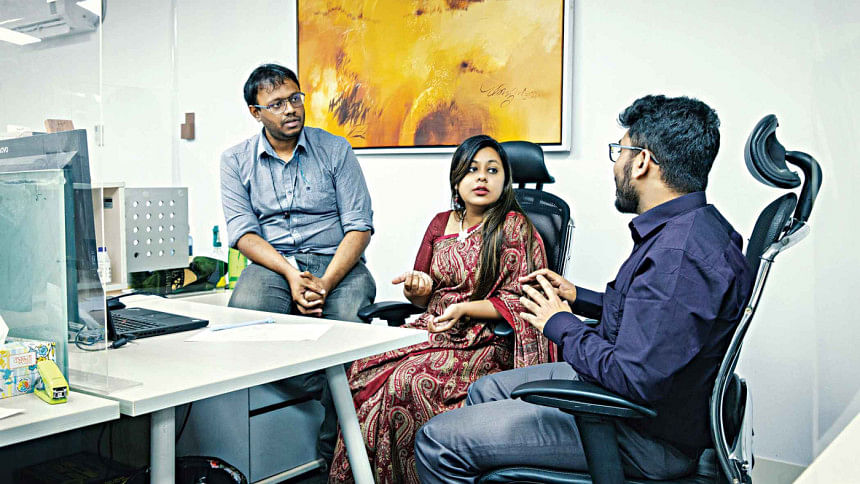Women thriving in the corporate sector

In order to promote such views towards the society at large regarding how an organisation plays a significant role to help women climb the corporate ladder, three amazing women from BAT Bangladesh share their views and experiences on this topic.
A progressive society starts with progressive policies
Adrita Datta, HR Business Partner at BAT Bangladesh, shares her opinion regarding women at the workplace from an HR lens.
LS: How far do you think the HR laws of our country support women at the workplace?
Datta: HR laws have evolved over the years, but there is still a long way to go. If the onus can be shared by workplaces making positive changes in small pockets, the path to progress becomes quicker and smoother. For example, at BAT, progressive attitude is prevalent through few policies.
To begin with, on top of the provided six-month maternity leave, our policy enables an extension up to nine months for female employees who are working in unconventional sectors such as in shifts at the factory or in outstation locations. We extend our maternity leave policy for parents who adopt a child, given that they are the primary caregiver, irrespective of their gender.
Emphasising on the fact that being a mother should not act as a barricade against career growth, we have introduced such novel policies. If more organisations and market leaders come up with such initiatives, this can inspire and influence national level policy changes.
LS:What are some of the challenges you face being a female team leader, if any?
Datta: When I started my career, the organisation was not sensitised to the niche needs of women because there were not too many women to begin with. In those days, I had to devise innovative ways of getting myself heard. However, as the company evolved and women rose up the rungs, I started being treated as a leader and not a female leader.
Sociocultural barriers still exist, but from a personal point of view, it is important to not be restricted by bond or boundary when it comes to growth in your career. If you want something, reach for it – all obstacles and negativity can be dealt with later.

Pioneering to cease common workplace stereotypes
Sadia Zahin, Company Environment, Health & Safety (EHS) Manager at BAT Bangladesh, speaks about breaking stereotypical attitudes at the workplace, having worked at the factory floor during odd hours.
LS: Throughout your professional journey, how have you tackled the hurdles faced?
Zahin: When I joined eight years ago, I was the only female member in a team of 17 people. Although I received sufficient support and cooperation from my male colleagues, proving myself as credible to the team was challenging. To tackle this, I combined the forces of intellect and empathy that eventually resulted in great teamwork!
Also, there was the question of whether I am fit for the role, which I had to prove through my actions. However, in my opinion, the stereotypical mind-set has altered quite a lot in the last few years, given that people are now seeing more females work in a factory environment and thus, embracing the fact that women can also work in unconventional places such as the factory floor even during odd hours.
LS: In your accord, what are the main drivers to keep thriving in this sector?
Zahin: According to me, a strong personality is the prime driver. Remaining enthusiastic regarding work has allowed me to thoroughly enjoy it as well. As long as you are confident, you are ready to tackle any obstacle thrown your way and you will thrive. But once you falter, that is when society and other associated factors begin to intervene.
The various roles of women
Mahmuda Peya, Area Manager (Dinajpur) at BAT Bangladesh, shares her sentiments about working in a male-dominant environment.

LS: From your experience, what are the stereotypes that still persist in today's time in regards to a female leadership role?
Peya: Speaking of the industry itself, this is definitely not a very orthodox one for women. Starting from farmers to sellers, it can be regarded as a highly male-dominant industry. But as more and more females are joining this sector, this stereotypical view is gradually fading, although at an incremental rate.
Adding to that, a major prejudice that still remains is the notion that females are assumed to take decisions emotionally rather than rationally, which is far from truth. We have to juggle between several roles pristinely and this is impossible to accomplish by always thinking from an emotional perspective.
Photo: Shahrear Kabir Heemel and BAT

 For all latest news, follow The Daily Star's Google News channel.
For all latest news, follow The Daily Star's Google News channel. 



Comments